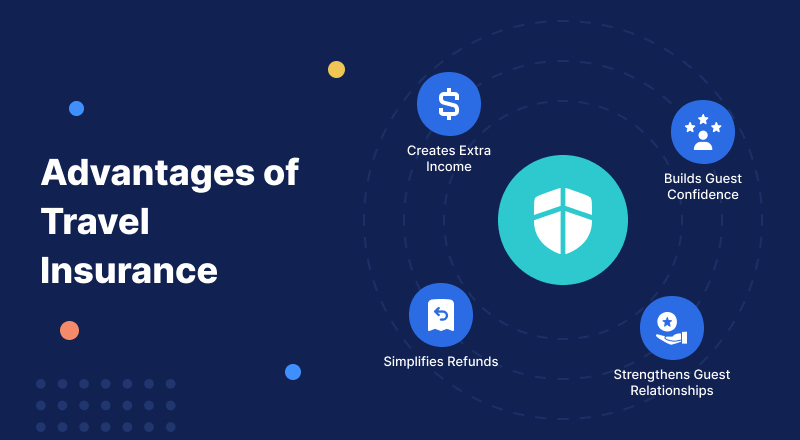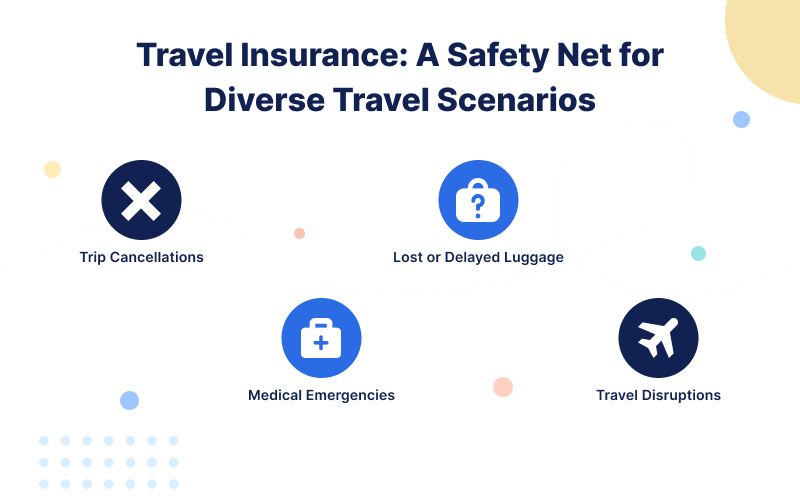Travel insurance is your go-to plan when vacations go wrong. From canceled trips to lost bags, unexpected medical costs, and even trip stacking scenarios, it saves the day.
For the hospitality industry, travel insurance is not just a nice to have it’s a must have to help travelers and hotels handle tricky situations.
What is a Travel Insurance?
Travel insurance is a safety net for travelers. It helps avoid financial stress caused by cancellations, health issues, or lost belongings. Simply put, it’s all about peace of mind.
Advantages of Travel Insurance
Builds Guest Confidence:
When travelers know they’re protected with travel insurance, it makes them feel more secure and comfortable booking trips.
Knowing they have financial protection if something goes wrong like a sudden illness, bad weather, or unforeseen events provides peace of mind.
This increased sense of security can lead to higher booking rates and more repeat business.
Strengthens Guest Relationships:
Offering travel insurance demonstrates a hotel’s commitment to guest care and their well-being.
By providing this service, hotels show they’re prepared to support guests through unexpected issues, which fosters a sense of trust and loyalty.
Guests appreciate the proactive approach to their safety and comfort, leading to a stronger emotional connection with the hotel brand.

Simplifies Refunds:
Travel insurance not only protects hotels from financial losses due to cancellations but also simplifies the process of refunds.
Insurance coverage can cover cancellation fees, which means if a guest needs to cancel their booking, the hotel doesn’t have to deal with the hassle and potential upset of refunding these costs.
This can be seamlessly managed by using a hotel reservation system, which not only saves time for hotel staff but also protects the hotel’s reputation by preventing disputes over refunds.
It reassures guests that they will be treated fairly, even when things don’t go as planned.
Creates Extra Income:
By partnering with reputable insurance providers, hotels can earn a commission for each policy sold.
This creates an extra income stream without requiring any additional resources from the hotel itself.
Travel Insurance: A Safety Net for Diverse Travel Scenarios
Trip Cancellations
When bad weather, illness, or other unforeseen cases force travelers to cancel their trips, travel insurance reimburses the costs of prepaid bookings, flights, or activities.
This ensures that guests don’t lose money and helps hotels maintain goodwill. It also mitigates the risk of disputes over cancellation policies.
Lost or Delayed Luggage
Travelers often face stress and inconvenience when their luggage is delayed or lost.
Travel insurance steps in to cover the cost of replacing essentials like clothing and toiletries.
For hotels, this can mean less stress for guests and a chance to offer support, improving their overall experience.

Medical Emergencies
If a guest falls sick or is injured during their trip, travel insurance covers medical expenses, hospital stays, and emergency evacuations.
This relieves the financial burden.
Travel Disruptions
Unforeseen events like natural disasters, airline strikes, or political unrest can disrupt travel plans.
Travel insurance covers additional costs, such as extra nights at a hotel or alternative transportation.
Guests feel reassured knowing they’re protected, which reflects positively on the hotel’s brand.
Key Insurance Types in Hospitality
General Liability Insurance
This type of insurance safeguards hotels against legal claims if a guest or employee is injured on the property.
For instance, if a guest slips and falls in the lobby, the insurance covers medical costs and legal fees, shielding the hotel from substantial financial loss.
Cyber Insurance
Hotels collect sensitive guest data, including personal and payment information.
Cyber insurance protects against financial and reputational damage caused by data breaches, hacking, or ransomware attacks.
Worker’s Compensation
Hotels employ a variety of staff, from housekeeping to maintenance teams.
If an employee is injured or becomes ill due to their work, worker’s compensation covers their medical expenses, rehabilitation costs, and lost wages.
Why Hotels Should Offer Insurance
Custom Options
Hotels can partner with insurance providers to create policies tailored to guests’ needs.
For instance, a beach resort might offer coverage for water sports injuries, or a ski lodge could include options for equipment loss.
Extra Income
Hotels can earn commissions by partnering with insurance companies and selling travel insurance as an add-on service.
This creates an additional revenue stream while enhancing the guest experience.
Stronger Reputation
Offering travel insurance demonstrates that a hotel prioritizes guest safety and satisfaction. Reassuring guests about their safety in the hotel builds trust and confidence.
Guests are more likely to trust and recommend a hotel that goes the extra mile to ensure their well-being.
Conclusion
Let’s face it, without insurance, the hospitality industry is a disaster waiting to happen.
From canceled trips to damaged property or even flying luggage, insurance keeps things running smoothly.
Running a hotel without it is like walking a tightrope without a net that is exciting, but not smart.
So here’s to insurance the unsung hero that saves hotels and travelers from chaos. Cheers!
Get in Touch
If you’re ready to explore how travel insurance can benefit your hotel or if you have any questions, QloApps is here to help!
Let’s work together to make your guest experience stress-free and your hotel operations smooth.
Explore how QloApps’ PMS and Channel Manager solutions can help you enhance your operations and maximize revenue. Reach out today!

Be the first to comment.